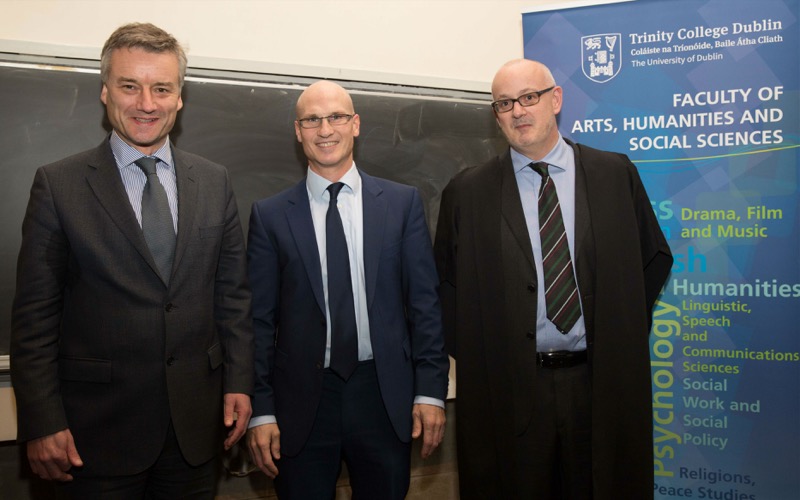Professor Layte Explores Social Inequality and Education in Inaugural Lecture
Posted on: 16 February 2015
Richard Layte, Professor of Sociology recently delivered his inaugural lecture on the impact of childhood environment in Ireland on future job opportunities and well-being. Professor Layte argued that current policy choices have reinforced patterns of disadvantage rather than reducing them and he concluded his lecture by exploring options open to governments who wish to promote equality and cohesion whilst pursuing a developmental agenda. The event, which was held in the Synge Theatre at Trinity College Dublin marked his appointment as the Professor of Sociology at Trinity College. The lecture was followed by a panel discussion with colleagues in the School of Social Sciences and Philosophy including Professor of Economics John O’Hagan, Assistant Professor in Mental and Moral Science, Paul O’Grady and Adjunct Assistant Professor Anne Wren in the School of Political Science.
In his lecture the new Professor of Sociology argued that the movement toward a social investment agenda based on the ‘developmental welfare state’ combined with decreased overall welfare effort and growing income inequality exacerbates existing inequalities in conditions and life chances between groups and thus undermines the capacity of disadvantaged groups to compete. Professor Layte commented that while
Income inequality has increased steadily across the majority of European states, patterns of social mobility and equality of opportunity have been stagnant or worsening and levels of income poverty have increased, particularly for children and young people.
Drawing on his recent research using the Growing Up In Ireland (GUI) study and the British Millennium Cohort Study, Professor Layte showed how childhood environment shapes a child’s physical, psychological and educational development from conception onward with consequences for health and equality of opportunity as an adult.
He pointed out these studies found that children of households in the lowest 20% of the income distribution were lighter at birth and shorter in childhood as well as being more likely to experience both acute and chronic ill health. Low income parents are three times more likely to experience depression and this has a significant impact on the child’s psychological adjustment. Worse physical and psychological development among lower income children is the primary reason why these children have reading scores 22% lower and maths scores 24% lower than those in the highest income group.
These patterns in childhood go onto influence which job the child will get and their risks of unemployment and lifetime earnings. In a globalised economy where innovation and entrepreneurship matter most this is not only a human tragedy but an appalling waste of human potential which this has important implications for equality of opportunity in Irish society, said Professor Layte.

The lecture also examined future policy options and made recommendations for policy that could improve equality of opportunity as well as contributing to growth in the Irish economy. “Ireland’s future prosperity depends on having an educated, creative and competitive workforce,” argued Professor Layte, "By investing in early childhood we will be developing healthier, happier and more productive adults for all our tomorrows – and saving money in the process.”
Reflecting on the lecture, the respondents presented alternate insights on social equality and economic growth from across the social sciences and philosophy. Examining income distribution, Professor John O’Hagan argued that government policy has had a significant positive impact and also emphasised that creating employment is not just an economic but also a major social policy priority. In her response, Professor Wren commented on the ways in which political factors have influenced the growth strategies that countries have pursued in recent decades, and the impact of political decision-making on patterns of inequality. Adding a philosophical perspective, Professor Paul O’Grady looked at the relationship of philosophical argumentation to empirical enquiry in the social sciences.
